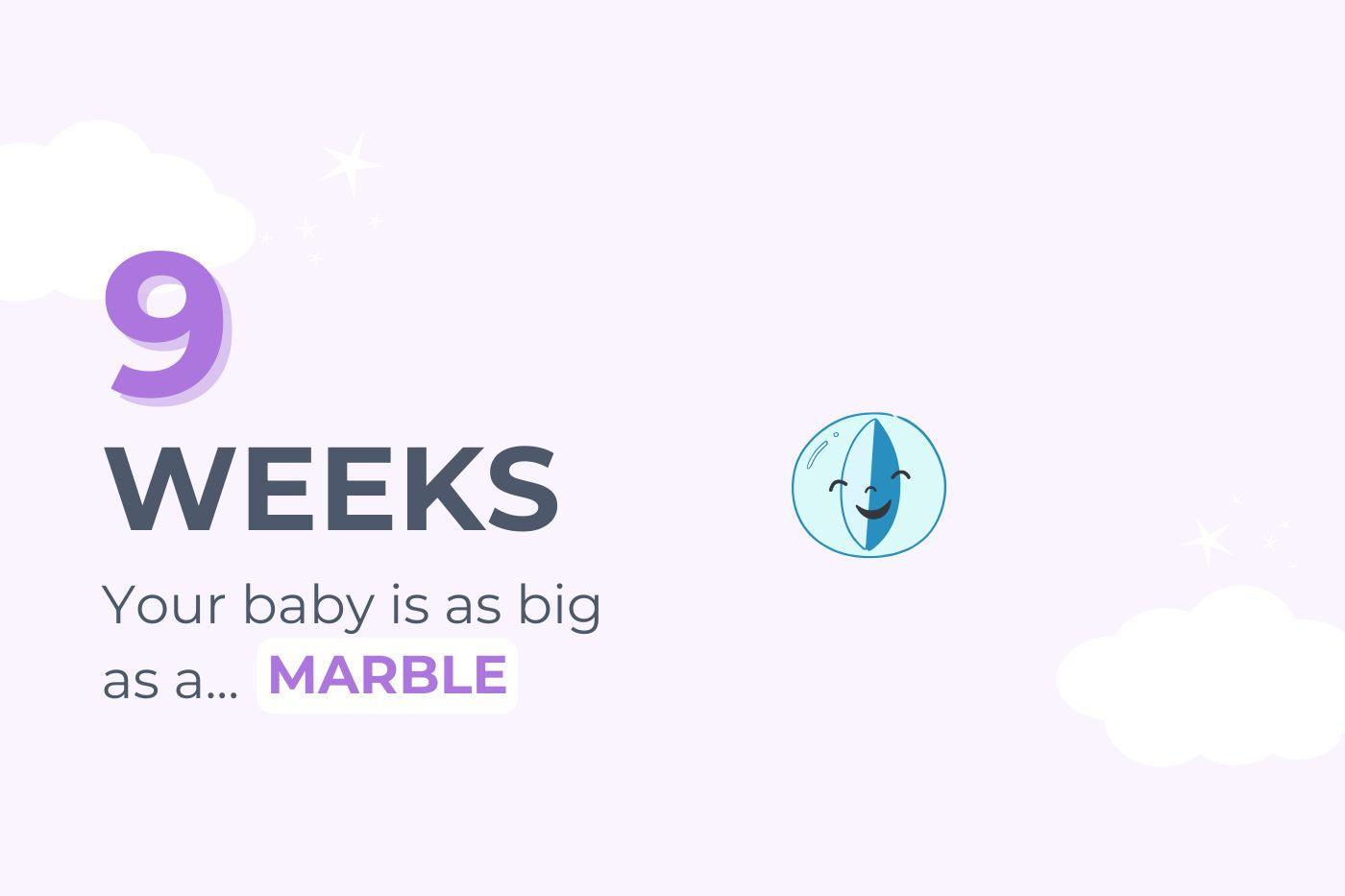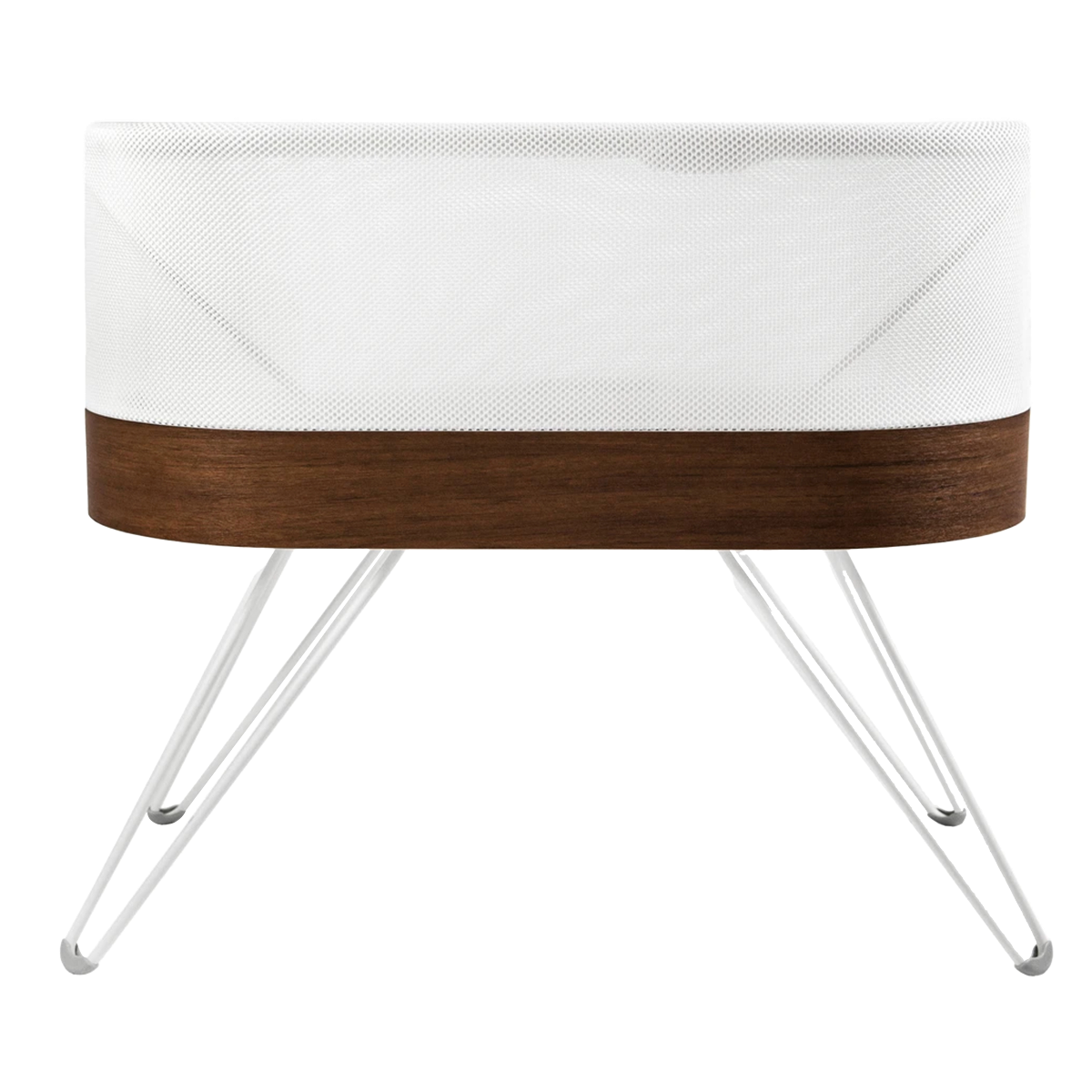PREGNANCY
9 Weeks Pregnant: Understanding Weight Gain
undefined

Written by
Dr. Harvey Karp

9 Weeks Pregnant
Size of Baby at 9 Weeks Pregnant:
At 9 weeks, your baby is the size of a marble, a grape, or your thumb nail!
To the outside world, no one would know that you’re pregnant, but inside you, your baby is growing at a rapid pace. This week, fingers, toes, and nails sprout from little hand and foot pads. Right now, in your belly, your baby may be sucking their thumb! And, fingerprints, that will be with your baby for life, come into focus. Deep in your baby’s jaw, there’s the start of tiny teeth. The vocal cords that they’ll use to make their very first cry are forming, and they might even start yawning (aww!). Your little one’s heart is almost completely developed, and all their major joints are in place to allow them to flex and move (though you probably won’t feel your tiny kickboxer’s antics until around week 16)!
9 weeks pregnant is how many months?
Nine weeks pregnant is about 2 months pregnant.
9 Weeks Pregnant: What to Expect
Never in your life will you scrutinize so closely your diet and weight as during pregnancy. Instead of gleefully eating for two, you’ll probably consider each bite twice as hard. Is it nutritious? Is it on the approved-foods list? Will it make me puke?
Doctors recommend gaining about 25 to 35 pounds during pregnancy. Underweight women are encouraged to gain 28 to 40 pounds, while overweight women aim for 15 to 25 pounds. Expecting parents carrying multiples gain more.
During the first trimester, you may not pack on any pounds—and if morning sickness is killing your appetite—you might even lose some weight. Weight gain typically begins in earnest in the second trimester. In your first trimester, your body doesn’t actually require any extra calories. In the second trimester, doctors recommend adding roughly 340 calories a day, and in the third around 450 calories.
So, what is “normal” when it comes to pregnancy weight gain? Every body is unique, and everyone will put on weight in different ways and at different rates. Expect to gain 3 to 5 pounds in the first trimester, while in the second trimester, you could gain around a pound a week, adding another 12 to 14 pounds. Weight gain slows slightly in the last trimester, with folks gaining an average of a half-pound to pound per week.
Where does all of that extra weight come from? Only about 6 to 8 pounds will be your baby, while your placenta and breasts add another 2 to 4 pounds. During pregnancy, your blood volume also swells, with 3 to 4 more pounds of blood pumping through your veins! Another 6 to 7 pounds is amniotic fluid, the muscles of your growing uterus, and other extra fluid (like swollen ankles). And then, of course, there’s added fat, which your body stores in preparation for the major caloric needs your body will have when to support your breastfeeding.
Weight gain is also a key way your doctor or midwife will track your progress…and make sure you and your baby are healthy. Your pregnancy weight gain is directly correlated with your baby’s birth weight. People who gain a lot usually have bigger babies and vice versa.
It can be hard not to stress about weight gain, but the bottom line is: As much as you can, try to skip processed foods, snacking, and sugar and put in your plate a healthy, balanced diet (plenty of protein, good fats, and veggies) and your body will do exactly what it needs to do!
9 Weeks Pregnant Symptoms
- Fatigue
- Nausea
- Sore breasts
- Moodiness
- Headaches
- Food aversions or cravings
- Heightened sense of smell
- Increased discharge
- Cramping
- Bloating
9 Weeks Pregnant: To-Do List
Tell your fitness instructors: Even if you’d like to wait until the end of the first trimester to shout your good news from the rooftop, it’s smart to let your fitness instructor in on the secret. Why? They’ll help tailor your workouts to each stage of pregnancy and will know not to push you too hard. You’ll want to stay active throughout pregnancy, even if all you feel up to is some light walking.
Pick up the dental floss: Poor oral hygiene is never good, but right now, you’re more susceptible to plaque and gum disease than ever. If you’re not already flossing, this is the time to pick up the habit! And while you’ve got your pearly whites on your mind, schedule a cleaning at your dentist, too. Left unchecked, gum disease can become periodontitis, which has been tied to preterm labor and low birth weight.
Invest in a maternity bra: As your breasts grow, your bras will get more and more snug. Not only is your chest growing, but your rib cage will also expand over the coming months! It’s smart to invest in a few soft, adjustable maternity bras to help you stay comfy over the next few months.
Decide on genetic testing: The first prenatal genetic tests start around 10 to 14 weeks gestation. Your doctor may do a special ultrasound of the baby’s neck (called the nuchal fold) and perhaps also a blood test to screen for Down Syndrome as well as the very rare Trisomy 18 and Trisomy 13. These tests are not 100% right every time, but they can raise a red flag that the risk is high. If there is an issue, your OB can do further testing, such as an amniocentesis or chorionic villus sampling (CVS). These have over 99% accuracy, but they also carry a small risk of miscarriage. A genetic counselor can help you weigh your options.
Myth or Fact: Your Moles Can Change During Pregnancy
Fact! Moles can darken in color, grow bigger, and sprout up in new places. This probably happens thanks to hormones! If a mole has irregular borders, becomes raised, very dark, is uneven in color or is painful, get it checked out by a dermatologist.
< 8 Weeks Pregnant | 10 Weeks Pregnant >
Disclaimer: The information on our site is NOT medical advice for any specific person or condition. It is only meant as general information. If you have any medical questions and concerns about your child or yourself, please contact your health provider.
SHARE THIS ARTICLE
MOST LOVED
Sleepytime Sidekicks












